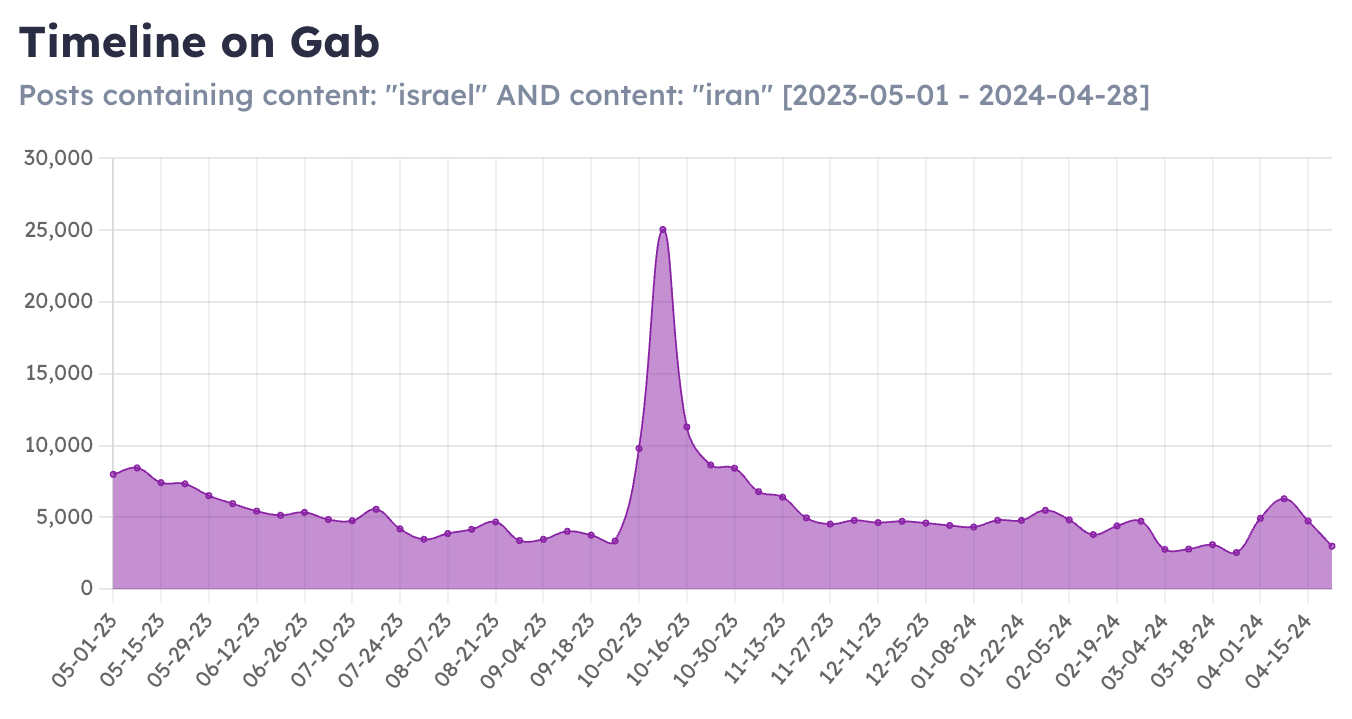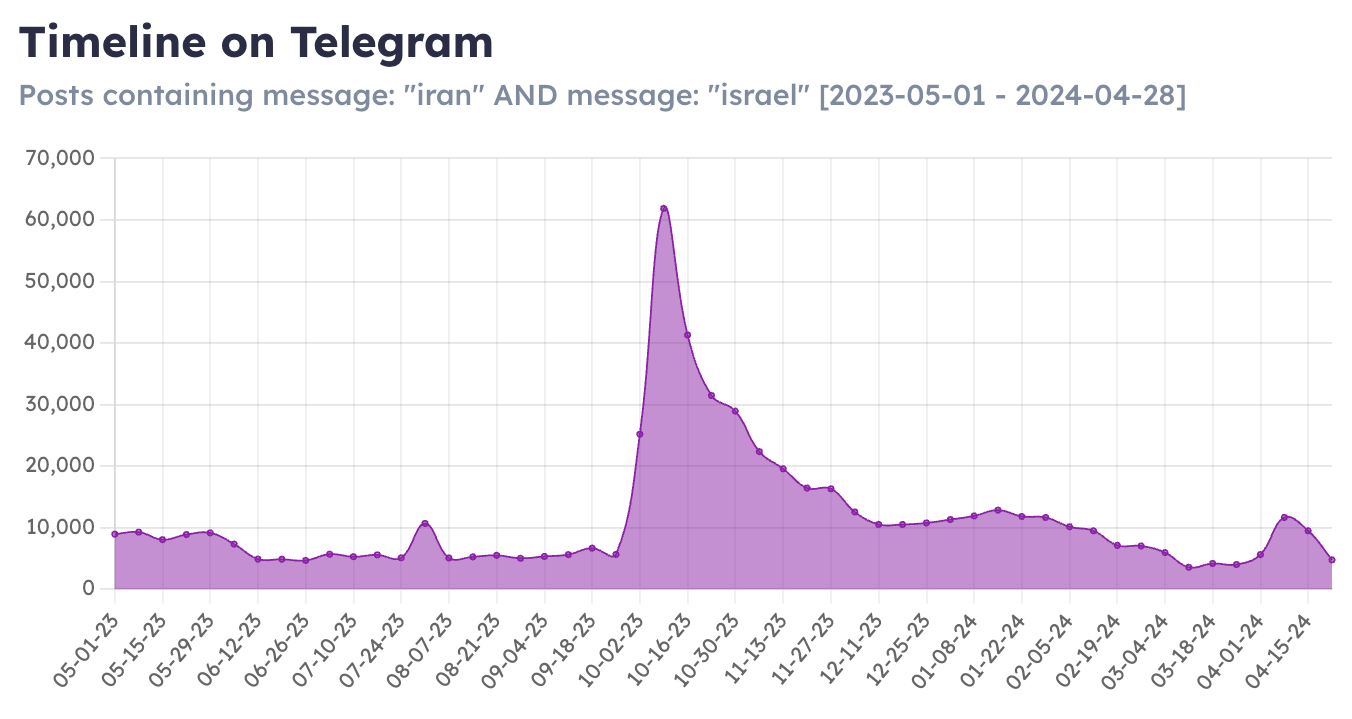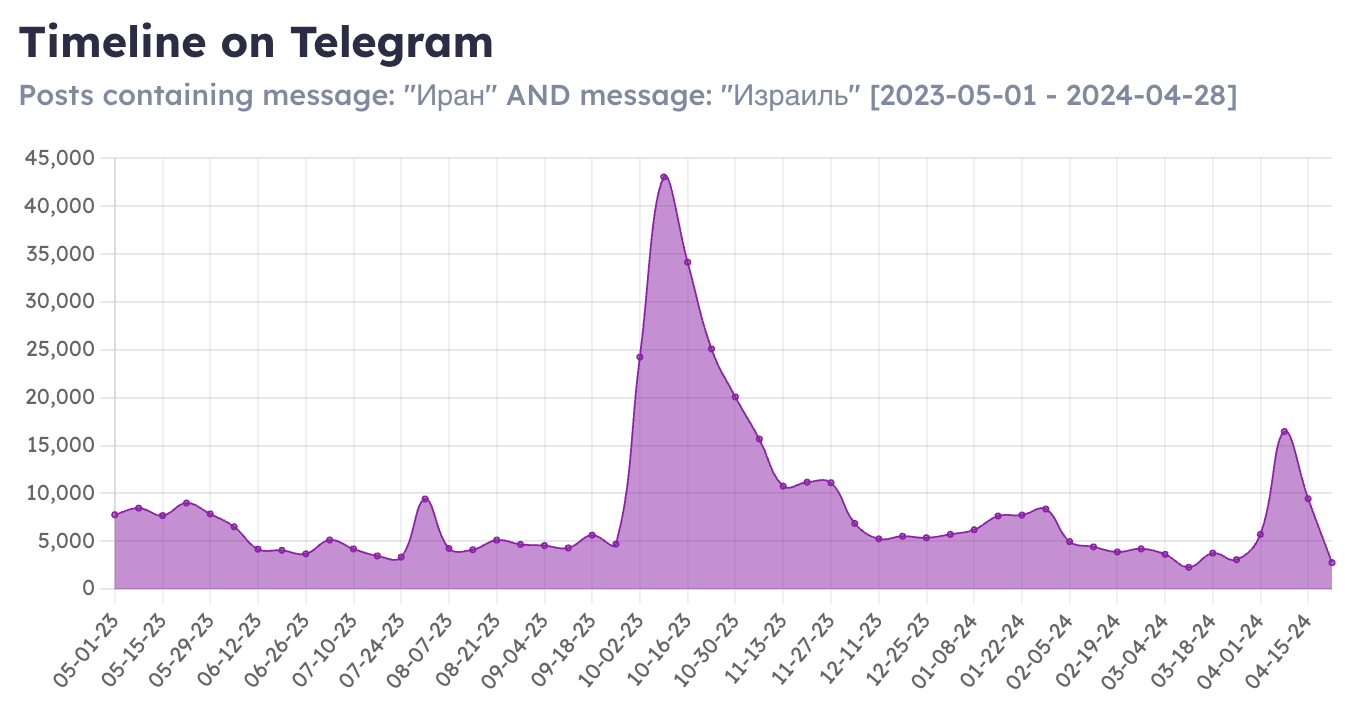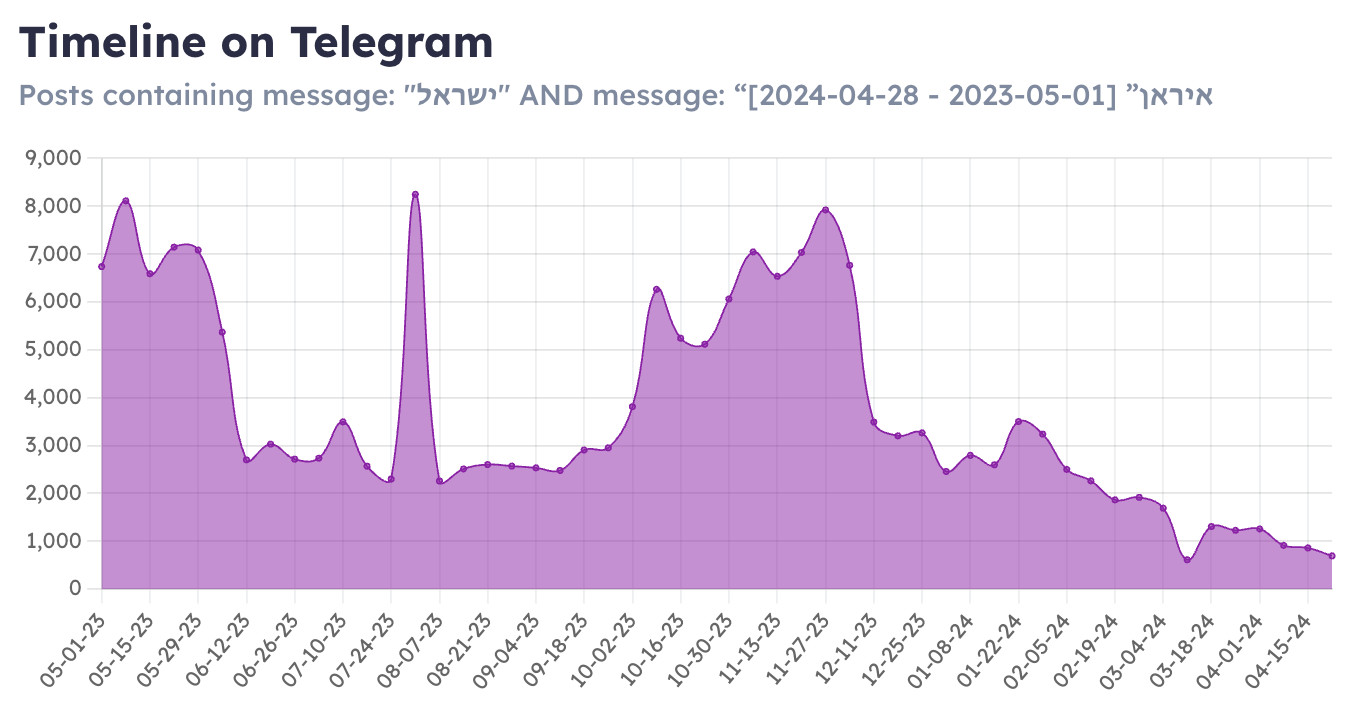Alt-Tech Chatter about the Israel-Iran Conflict
The Israel-Iran conflict has been an active topic on Gab and Telegram, though with different patterns for Farsi, Russian, Arabic and Hebrew-language users.
TLDR
The Israel-Iran conflict has escalated following Israeli strikes on Apr. 1, 2024, against an Iranian consulate, which set off a series of retaliatory attacks between the two countries.
Posts on Gab about the topic ranged from sharing news articles to expressing antisemitic and Islamophobic views.
Chatter about Iran and Israel on Telegram and Gab followed similar trends, with interest in the topic spiking after the Oct. 7, 2023, attacks carried out by Hamas and spiking once again at the start of April 2024.
Over the past year, Farsi- and Arabic-speaking Telegram users were most engaged in Israel and Iran discussions in April 2024; Hebrew-, Russian- and English-speaking Telegram users’ interest in the topic was greatest after Hamas’ Oct. 7 attack on Israel.
Background
Tension between Israel and Iran intensified after an Israeli airstrike on April 1, 2024, targeting the Iranian consulate in Syria, killed 13, including members of the Iranian Revolutionary Guard Corps.1
On April 13, 2024, Iran responded by launching hundreds of drones and missiles at targets inside Israel. The majority of these attacks were intercepted and damage inside Israel was minimal.2 In retaliation, Israel launched a counterstrike in Iran’s Isfahan province on Apr. 19, 2024.3 Whether this conflict will continue to escalate and how remains an open question.
Researchers at Open Measures looked at how these events were being discussed on Gab and Telegram. Gab is an American, alt-tech social media platform launched in 2016. Similar to other alt-tech platforms, Gab is marketed as free speech-friendly and as such has limited content moderation. Telegram is an app facilitating both private messaging and larger, channel-based messaging. Some of these channels are public and may contain hundreds of thousands of members exchanging news, opinions, advice and more.
Gab Discussion of the Israel-Iran Conflict
Gab is an American, alt-tech social media platform launched in 2016. Similar to other alt-tech platforms, Gab is marketed as free speech-friendly and as such has limited content moderation.
Mentions of the Israel-Iran conflict on Gab have increased since Hamas’ attacks on Oct. 7, 2023. Researchers searched Open Measures’ Gab dataset using the following query to examine levels of chatter:
content: "israel" AND content: "iran"

From the week of May 1, 2023 to Sept. 25, 2023 (the last full week before the Oct. 7 attack), there were an average of 94 posts per week about both countries. In the months since, activity increased to an average of nearly 300 posts a week.
In the first full week after the Oct. 7 attacks, there were 1,769 posts mentioning both countries. Interest in the topic has increased again in April 2024, following the Israeli attack on the Iranian consulate.
Open Measures researchers looked at posts that spanned three days in April as a sample. The content of the posts shared news articles and information about the conflict as well as commentary and opinions. The commentary ran the gamut, including both pro-Israel and pro-Iran sentiments. More disturbingly, researchers also observed instances of antisemitism and Islamophobia.
Other topics that were relatively common included criticism of the Biden administration, worries about terrorism in the US, and concerns about wider potential global conflict.
Searches for the terms “Israel” and “Iran” in Arabic on Gab over the past year returned five results, whereas searches in Hebrew returned just one. Searches for the same terms in Farsi, the most prevalent language in Iran, returned two results, and searches in Russian during the same time period returned no results.
Telegram Discussion of the Israel-Iran Conflict
Telegram is an app facilitating both private messaging and larger, channel-based messaging. Some of these channels are public and may contain hundreds of thousands of members exchanging news, opinions, advice and more.
Open Measures researchers took a look at the volume of messages on Telegram containing both “Iran” and “Israel” using the following query:
message: "iran" AND message: "israel"

The results were similar to those observed on Gab, with relatively little interest in the months before the Oct. 7 attacks and an average 94 messages a week mentioning both countries. Since Oct. 7, this average has increased to more than 630 messages a week.
There have been two primary spikes in interest, first in the weeks following Oct. 7 and again following the Israeli attacks on the Iranian consulate. The week of April 8–15 alone generated more than 2,000 mentions; chatter about “Iran” and “Israel” in Russian showed a similar pattern of interest.

Open Measures researchers also looked for mentions of both countries’ names in the same message in Arabic, Hebrew, and Farsi, and the results were somewhat different than those observed in Russian and English.
In the Arabic messages, there was a marked bump in interest following the Oct. 7 attacks, which then declined somewhat before spiking again in April 2024. The April 2024 bump of 688 messages was even larger than the Oct. 2023 bump, which saw 353. This could suggest that Arabic-speaking Telegram users are currently more invested in the Israel-Iran conflict than they were previously.

Farsi-language interest in Israel and Iran on Telegram looked somewhat similar to Arabic-language interest though at a much greater volume, with over 24,000 messages mentioning both countries over the past year. Similar messages increased following Oct. 7, before declining and then significantly spiking in April 2024.

The Hebrew-language example provides an interesting contrast. Messages mentioning Iran and Israel spiked in Oct. 2023, though the percentage increase from Sept.–Oct. 2023 was smaller than in other language groups.
For instance, chatter in English increased by 1,490% from Sept.–Oct. 2023; the increase during that same time period in Hebrew was 224%. Interest in the topic declined following Oct. 7. By mid-March, there were no mentions of the two countries together within Open Measures’ Telegram dataset.

Interest picked back up again following the April 2024 attack on the Iranian consulate in Syria, though overall, chatter remained relatively depressed. Activity is now actually lower than it was before Oct. 7, with just 46 mentions of the two countries together in Hebrew in April 2024. In the three full months preceding Oct. 7, there were, on average, 81 monthly mentions.
Open Measures’ Telegram dataset is composed of channels that have been flagged by our community of researchers. We invite all readers to reach out with Telegram channels they would like to see added to Open Measures’ collections, whether focused on current conflicts in the Middle East or otherwise known to be rife with extremism and disinformation.
Check out our new Crawl Requests feature and reach out to our team directly if you’d like to use our new tooling.
Conclusion
Examining both Gab posts and Telegram messages revealed a similar pattern of interest in Iran and Israel across the two platforms. Chatter about the Israel-Iran conflict spiked immediately after last year’s Oct. 7 attacks and again recently, following the Israeli airstrike against the Iranian consulate and subsequent counterstrikes between the two countries.
An investigation of the chatter on Gab showed a mix of users sharing news about the Israel-Iran conflict as well as expressing outright Islamophobia or antisemitism.
Interest on Telegram was similar, but showed slight variations between language groups, with the relative level of interest in both two countries changing over time. Interest in Iran and Israel among Farsi- and Arabic-speaking Telegram users is currently at its peak, whereas in Russian, English and Hebrew, interest peaked in the weeks following Oct. 7, 2023.
Identify online harms with the Open Measures platform.
Organizations use Open Measures every day to track trends related to networks of influence, coordinated harassment campaigns, and state-backed info ops. Click here to book a demo.
Bowen, J. (2024, April 1). Iran accuses Israel of killing generals in Syria strike. BBC News. Here.



